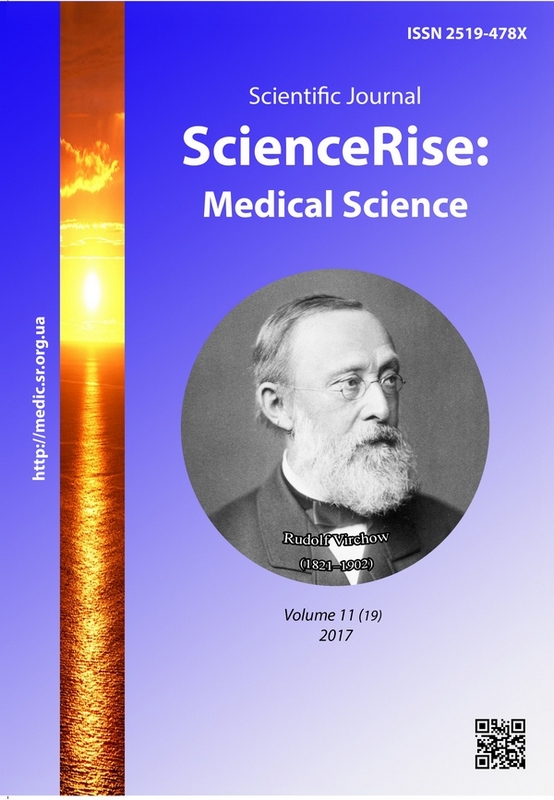Hygienic assessment of quality and way of life of youth
DOI:
https://doi.org/10.15587/2519-4798.2017.116759Keywords:
life quality, physical, psychological content of health, female students, socio-hygienic factorsAbstract
The paper presents the results of the study of life style and quality of female students of higher educational institutions.
Aim of research: to estimate life quality indices and their connection with socio-hygienic factors of life activity of girls 17 – 22 years old for substantiating arrangements of the active prophylaxis of health disorders of the female contingent of the early active reproductive age.
Materials and methods. 284 female students of higher educational institutions of city Sumy (І group (n= 135)– 17 – 19 years old, ІІ group (n= 149) – 20 – 22 years) took part in the research. Their life quality was estimated using the non-specific questionnaire «SF-36», socio-hygienic factors were studied using the specially elaborated form.
Results of research. There were determined quantitative characteristics of the physical (67,03±1,30 points) and psychological (59,69±1,26 points) components of health. Values of physical and psychological components of health of girls 20 – 22 years old are reliably lower comparing with the younger age group (17 – 19 years). Age differences of the parameter “Physical component of health” appear at the expanse of decreasing a mark of the routine role physical functioning and a mark of the general health status of girls 20 – 22 years old comparing with girls of 17 – 19 years. The psychological heath component reliably differed in the chosen age diapasons mainly at the expanse of the role emotional functioning decrease in girls of II group. It was established, that the parameter “General health status” is a system-creating factor of the life quality for the contingent of female students in general by the number of correlations. The role physical functioning, which high mark is connected with the absence of limitations for physical loads, high level of the general health status and emotional condition that helps in everyday activity, is an important factor in the group of girls of 17 – 19 years. Age features of the life quality of female students 20 – 22 years old are in the fact that the social functioning has a reverse correlative connection with the physical functioning, role physical functioning and general health status and prove the fact of the priority of the high level of the motivation, volitional effort, purposefulness for providing the high level of the social functioning.
Conclusions. The life quality of female students depends on a series of socio-hygienic factors, such as: education of the mother, physical activity level, smoking, alcohol intake, pathologies of the respiratory system, digestion, nervous and reproductive systems. Quantitative characteristics of the dependence of the life quality on the complex of factors allow to substantiate arrangements of the prophylaxis of health disorders of the female contingent of the early reproductive age scientifically
References
- Rynhach, N. O. (2009). Hromadske zdorovia yak chynnyk natsionalnoi bezpeky. Kyiv: NADU, 296.
- Shafranskiy, V. V. (Ed.) (2016). Shchorichna dopovid pro stan zdorovia naselennia, sanitarno-epidemichnu sytuatsiyu ta rezultaty diyalnosti systemy okhorony zdorovia Ukrainy. 2015 rik. Kyiv, 452.
- Polka, N. S., Berdnyk, O. V. (2013). Suchasni pidkhody do otsinky stanu zdorovia v hihiieni dytynstva. Zhurnal NAMN Ukrainy, 19 (2), 226–235.
- Berdnyk, O. V. (2009). Zberezhennia zdorovia zdorovykh – nahalna potreba suchasnoi medytsyny. Medyko-ekolohichni ta sotsialno-hihiienichni problemy zberezhennia zdorovia ditei v Ukraini. Kyiv, 21–26.
- Measuring Healthy Days. Population Assessment of Health-Related Quality of Life (2000). U.S. Department of health and human services. Atlanta, 40. Available at: https://www.cdc.gov/hrqol/pdfs/mhd.pdf
- Zhdanov, I. O., Bieliaieva, I. I., Mytrofanskyi, S. V. et. al. (Eds.) (2015). Natsionalno-patriotychne vykhovannia – derzhavnyi priorytet natsionalnoi bezpeky. Shchorichna dopovid Prezydentu Ukrainy, Verkhovniy Radi Ukrainy pro stanovyshche molodi v Ukraini (za pidsumkamy 2014 roku). Kyiv, 200.
- Novik, A. A., Ionova, T. I. (2002). Rukovodstvo po issledovaniyu kachestva zhizni v medicine. Sankt-Peterburg: Izdatel'skiy Dom «Neva»; Moscow: «OLMA-PRESS Zvezdnyy mir», 320.
- Danilenko, G. M., Sotnіkova, Zh. V. (2005). Yakіst' zhittya ta zdorov’ya shkolyarіv. Vіsnik Harkіvs'kogo nacіonal'nogo unіversitetu іmenі V. N. Karazіna. Serіya: Medicina, 658, 62–67.
- Jenkinson, C., Coulter, A., Wright, L. (1993). Short form 36 (SF36) health survey questionnaire: normative data for adults of working age. BMJ, 306 (6890), 1437–1440. doi: 10.1136/bmj.306.6890.1437
- Ware, J. E., Snow, K. K., Kosinski, M., Gandek, B. (1993). SF-36 Health Survey. Manual and interpretation guide. The Health Institute, New England Medical Center. Boston, Mass., 316.
- Tsos, A., Homych, A., Sabirov, O. (2013). The state of physical and psychological components of health in the quality of life of the university students. Człowiek i Zdrowie, VII (2), 8–12.
Downloads
Published
How to Cite
Issue
Section
License
Copyright (c) 2017 Dmytro Kalynychenko

This work is licensed under a Creative Commons Attribution 4.0 International License.
Our journal abides by the Creative Commons CC BY copyright rights and permissions for open access journals.
Authors, who are published in this journal, agree to the following conditions:
1. The authors reserve the right to authorship of the work and pass the first publication right of this work to the journal under the terms of a Creative Commons CC BY, which allows others to freely distribute the published research with the obligatory reference to the authors of the original work and the first publication of the work in this journal.
2. The authors have the right to conclude separate supplement agreements that relate to non-exclusive work distribution in the form in which it has been published by the journal (for example, to upload the work to the online storage of the journal or publish it as part of a monograph), provided that the reference to the first publication of the work in this journal is included.









